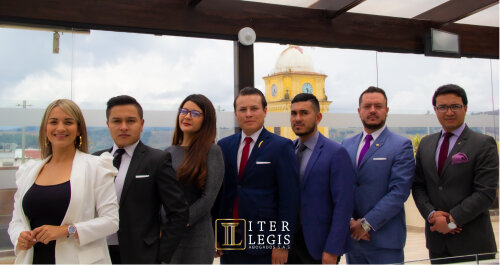Best Merger & Acquisition Lawyers in Tunja
Share your needs with us, get contacted by law firms.
Free. Takes 2 min.
List of the best lawyers in Tunja, Colombia
About Merger & Acquisition Law in Tunja, Colombia
Merger and Acquisition (M&A) law in Tunja, Colombia, refers to the legal processes and regulations governing the combination of two or more companies or the purchase of one company by another. This area of law includes due diligence, negotiations, compliance with national and local regulations, contract drafting, and the formal registration of transactions with authorities. In Tunja, as in the rest of Colombia, M&A activities are influenced by national commercial codes, antitrust regulations, labor laws, and tax implications.
Why You May Need a Lawyer
Engaging in M&A activities can be complex and risky. People and businesses may require legal help in situations such as:
- Assessing a potential merger or acquisition target and determining its legal standing.
- Conducting due diligence to identify risks, liabilities, and compliance issues.
- Negotiating terms of a deal to ensure favorable conditions and protection of interests.
- Drafting and reviewing contracts and agreements to ensure clarity and legality.
- Navigating local regulations, tax considerations, and employment law related to M&A transactions.
- Facilitating the registration of the transaction with the Chamber of Commerce or other regulatory authorities.
- Managing post-transaction integration and potential disputes.
A lawyer with specialized knowledge of M&A law can help you avoid costly errors and ensure the transaction complies with local and national legislation.
Local Laws Overview
M&A transactions in Tunja are subject to several important laws and regulatory frameworks:
- Colombian Commercial Code: Governs company formation, organization, and modification, including mergers and dissolutions.
- Superintendence of Companies: Overlooks the legality of certain M&A activities, especially those involving large companies or those with significant public interest.
- Antitrust Legislation: Transactions must be reviewed to ensure they do not create monopolies or unfair market dominance, as enforced by the Superintendence of Industry and Commerce.
- Labor Laws: Employee rights must be considered, as mergers or acquisitions can imply changes in labor contracts or workforce integration.
- Tax Laws: M&A activities may trigger taxes such as capital gains or VAT depending on the structure of the deal.
- Local Regulations: The Tunja Chamber of Commerce plays a key role in registering and approving changes to business structures resulting from mergers or acquisitions.
Compliance with these laws ensures the smooth completion and future stability of the merged or acquired entity.
Frequently Asked Questions
What is the typical process for an M&A transaction in Tunja?
The process usually involves initial negotiations, due diligence, drafting and signing of agreements, regulatory approvals, and finally the formal transition and registration of the new business structure.
Do mergers or acquisitions require government approval in Tunja?
Depending on the size and type of the companies involved, some mergers or acquisitions may require approval from regulatory bodies, especially if antitrust or public interest concerns are present.
How long does a standard M&A transaction take in Tunja?
The duration varies depending on the complexity of the deal, but even straightforward transactions can take several months to complete from negotiations to final registration.
What are the main risks in M&A transactions?
Risks include undiscovered liabilities, non-compliance with local laws, tax issues, labor disputes, and challenges in integrating the businesses' operations or cultures.
Is due diligence mandatory for M&A in Tunja?
While not strictly required by law, due diligence is highly recommended to uncover potential legal, financial, and operational risks.
What taxes apply to M&A deals in Colombia?
Taxes such as capital gains, value-added tax (VAT), registration fees, and stamp duties may be triggered depending on the type and structure of the transaction.
Can foreign companies acquire businesses in Tunja?
Yes, foreign investment is permitted in most sectors, but it must comply with national foreign investment laws and certain industry-specific regulations.
How are employees affected by a merger or acquisition?
Employee contracts may be transferred or renegotiated. The acquiring company must respect existing labor rights and, in some cases, negotiate collective bargaining agreements.
What happens if the parties disagree after the acquisition?
Disputes may be resolved through negotiation, mediation, arbitration, or the local courts, depending on the terms in the agreements and relevant Colombian law.
Is it necessary to register the new company structure after an M&A?
Yes, changes must be registered with the Chamber of Commerce of Tunja and other relevant authorities to ensure legal recognition and continuity.
Additional Resources
For those seeking more information or assistance regarding M&A in Tunja, the following resources can be helpful:
- Tunja Chamber of Commerce: Key for business registration and information on local compliance requirements.
- Superintendence of Companies: Regulates corporate modifications and ensures legal compliance in significant transactions.
- Superintendence of Industry and Commerce: Handles issues related to antitrust and competition law.
- Colombian Ministry of Commerce, Industry, and Tourism: Provides guidance on foreign investment and business regulations.
- Law firms and local bar associations in Tunja: Offer legal advice and specialized support in M&A matters.
Next Steps
If you are considering a merger or acquisition in Tunja, Colombia, your best course of action is to consult with a qualified local attorney who specializes in corporate and commercial law. Gather all relevant business documents and have a clear idea of your objectives. Consider conducting an initial legal consultation to understand your rights, obligations, and the road ahead. Proper legal guidance will help you avoid pitfalls, ensure regulatory compliance, and achieve a successful transaction.
Lawzana helps you find the best lawyers and law firms in Tunja through a curated and pre-screened list of qualified legal professionals. Our platform offers rankings and detailed profiles of attorneys and law firms, allowing you to compare based on practice areas, including Merger & Acquisition, experience, and client feedback.
Each profile includes a description of the firm's areas of practice, client reviews, team members and partners, year of establishment, spoken languages, office locations, contact information, social media presence, and any published articles or resources. Most firms on our platform speak English and are experienced in both local and international legal matters.
Get a quote from top-rated law firms in Tunja, Colombia — quickly, securely, and without unnecessary hassle.
Disclaimer:
The information provided on this page is for general informational purposes only and does not constitute legal advice. While we strive to ensure the accuracy and relevance of the content, legal information may change over time, and interpretations of the law can vary. You should always consult with a qualified legal professional for advice specific to your situation.
We disclaim all liability for actions taken or not taken based on the content of this page. If you believe any information is incorrect or outdated, please contact us, and we will review and update it where appropriate.









